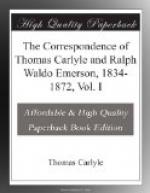Your objections to Goethe are very natural, and even bring you nearer me: nevertheless, I am by no means sure that it were not your wisdom, at this moment, to set about learning the German Language, with a view towards studying him mainly! I do not assert this; but the truth of it would not surprise me. Believe me, it is impossible you can be more a Puritan than I; nay, I often feel as if I were far too much so: but John Knox himself, could he have seen the peaceable impregnable fidelity of that man’s mind, and how to him also Duty was infinite,—Knox would have passed on, wondering not reproaching. But I will tell you in a word why I like Goethe: his is the only healthy mind, of any extent, that I have discovered in Europe for long generations; it was he that first convincingly proclaimed to me (convincingly, for I saw it done): Behold, even in this scandalous Sceptico-Epicurean generation, when all is gone but hunger and cant, it is still possible that Man be a Man! For which last Evangel, the confirmation and rehabilitation of all other Evangels whatsoever, how can I be too grateful? On the whole, I suspect you yet know only Goethe the Heathen (Ethnic); but you will know Goethe the Christian by and by, and like that one far better. Rich showed me a Compilation* in green cloth boards that you had beckoned across the water: pray read the fourth volume of that, and let a man of your clearness of feeling say whether that was a Parasite or a Prophet.—And then as to “misery” and the other dark ground on which you love to see genius paint itself,—alas! consider whether misery is not ill health too; also whether good fortune is not worse to bear than bad; and on the whole whether the glorious serene summer is not greater than the wildest hurricane,—as Light, the Naturalists say, is stronger a thousand times than Lightning. And so I appeal to Philip sober;—and indeed have hardly said as much




